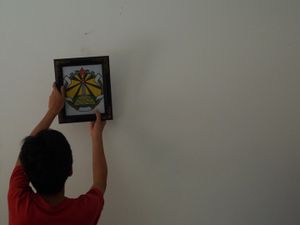Mustafa Hakim
| Mustafa Hakim | |
|---|---|
5 July 2016 | |
20 September 2019 - 2 May 2020 | |
| Predecessor | Tommy N. |
| Successor | Eri Septio Priangga |
July 2013 - 20 July 2016 | |
| Predecessor | Position established |
| Successor | Position abolished |
16 February 2012 - 21 August 2012 | |
| Predecessor | Dicky L. K. |
| Successor | National Salvation Council |
18 December 2012 - 4 July 2013 | |
| Predecessor | Abdul Rasyid I |
| Successor | Tian Abdurrahman |
3 October 2012 - 18 December 2012 | |
| President | Abdul Rasyid I |
| Predecessor | Position established |
| Successor | Himself (as President of Indokistan) |
16 September 2012 - 3 October 2012 | |
| Predecessor | National Salvation Council |
| Successor | Abdul Rasyid I (as President of Indokistan) |
26 August 2012- 16 September 2012 | |
| Predecessor | Himself (as President of Indokistan) |
| Successor | Indokistani Federal Council |
20 September 2010 - 15 February 2012 | |
| President | Farhan Abbas Dicky L. K. |
| Predecessor | Position established |
| Successor | Position abolished |
| Nationality | Indonesian |
| Political party | United Republican Party (2011) United Peoples Party (2011-2012) Solidarity Party (2012) Independent (since 2013) |
| Religion | Islam |
Mustafa Hakim is an Indonesian micronationalist and former Indokistani politician currently serving as the Chair of Suwarnakarta Institute since 2016. He was the former Secretary General of the Association of Indonesian Micronations, serving from September 2019 until 2 May 2020.
He was one of the founders of Indokistan, joining Farhan Abbas and Dicky L. K. on declaring Indokistani establishment in 16 September 2010. He served as the country's only Prime Minister from 2010 until 2012, and as President in 2012 and early 2013. Besides his national office, he served as the only governor of his home state, the federal city of Suwarnakarta.
During his career in Indokistan, he was one of the main driving force on the Indokistani governmnent, constantly maintained a significant activity level in the county. He was one of the most prolific member of the direct democratic National Forum, setting an example for other members. He was also the main architect of Indokistani foreign policy and served as the main ambassador of Indokistan on micronational community and intermicronational organisations, such as AIM, MASA, and GUM.
Indokistan
Establishment of Indokistan
The first people to gave idea on establishing a micronation, Mustafa's aspiration was supported by Farhan Abbas and Dicky L. K., and he successfully convinced to form the nation of Indokistan. He was the writer of the proclamation of establishment text and become a great contributor for the nation since then, especially after his appointment as prime minister by Farhan.
Prime ministership
After his appointment as prime minister, his first act was to form a parliament and a council of minister. On this period, he was the only Indokistani representative to foreign micronations. Hence, he acted as Indokistan's ambassador on diplomacy, editor of Indokistan-related information in MicroWiki, and the main editor of the Indokistan News Network.
He maintained the country's morale during Indokistan-Ntolian War and quickly controlled the situation after Nameless incident that occured simultaneously on April 2011. On June 2011, he authorised the process to convert Indokistan as a single-party state under United Peoples Party after order from president Farhan Abbas, and also clarified this issue after Indrawan Prasetyo of Los Bay Petros attacked the move.
After Dicky L. K. secured his victory in 2011 election, he trusted Mustafa to became his head of government. His second term was stable compared with his first, with only minor issues occurred inside the country. In November 2011, he contributed on the formation of first constitution and authorizes an embargo against Santos.
Presidency
On 15 January 2012, Dicky L. K. resigned, compelling him to ascend to the acting presidency. Shortly after his ascension as president, he decided to contribute in the unification attempt to form Indonovia, which was a failure. On August 2012, he declared the establishment of emergency government in August 2012 to address an inactivity crisis, which survived until Kingdom of Al Rasyid Darussalam and Bobodolands unified with Indokistan to establish Federal Republic of Indokistan in September. In the Federal Republic, he was the member of Federal Council, a position he shared with Tian Abdurrahman and Abdul Rasyid I.
After regained his presidential seat after departure of Abdul Rasyid I in December 2012, he declared establishment of a provisional government and starting the process of national reform. On this era, he contributed on the reunification of Raflesinesia and Kingdom of Wirasena to Indokistan on February and March 2013. Presidential election was took place in June 2013, resulting on the victory of Tian Abdurrahman, ended his reign as president, as the new president also started new era of Indokistan, which was the formation of the Federal State of Indokistan.

Federal State
After July 2013, Mustafa had no other political position than the governor of Suwarnakarta and member of the National Forum. He always showed his enthusiasm to the forum, recorded high attendance rate on the sessions and frequently proposed new legislation. He was trusted to become the main adminnistrator for the National Forum's session rooms, though the nominal head of the Forum was the president.
He was the main Indokistani representative to the Madyaraksa Committee established in August 2014 in a bid to set up a confederation with Los Bay Petros to address inactivity issues in the two countries. However, Los Bay Petros suddenly recalled their representatives, causing the project to fail.
Realising Indokistan's inactivity worsen by mid-2015, Mustafa decided the country should take mitigation actions. His proposal to abolish government institutions, including the Indokistan Armed Forces, was accepted by Forum members in April 2016. Despite efforts to streamline the country's administration, Indokistan's inactivity level failed to recover.
Acknowledging that Indokistan cannot continue with its inactivity, Mustafa took an unprecedented move to propose the country's dissolution. Despite initial opposition, the move was accepted as other members began to acknowledge the condition in Indokistan. Following the ratification of the dissolution decree in 24 June 2016, Mustafa presided over the trasition process ahead of Indokistan's dissolution.
On 5 June 2016, the day Indokistan dissolved, Mustafa was handed responsibilty to handle the residual transition process, including to observe the states' landclaims and former Indokistani institutions and assets that could not be divided. After the delayed dissolution of Aziziyah in 20 July, Mustafa declared his resignation as Suwarnakarta governor and declared the province extinct.
Post-Indokistan
His decision to disband his home state Suwarnakarta closed the history of Indokistan, as no successor state arose from the remnants of the country. He then founded Suwarnakarta Institute on July 2016 to accommodate his commitment to continue his micronational activities without gaining another micronational citizenship. The Institute enables him to maintain contact with micronationalists, especially those of AIM, which elevated the Institute as non-country observer, the very first in the association.
He continue supporting newly-arrived Indonesian micronationalists and provide guidance to young leaders, especially to access the AIM and MicroWiki community. He remained relatively active in AIM, engaging in discussion and consistently attending general assembly sessions, despite his institution have no voting rights.
He has no intention to establish a new micronation or to revive Indokistan, as he believed that he is the only one of Indokistan's former citizens to remain committed to micronationalism and his belief that a micronation should not be run by only one man.
Secretary General of AIM
In July 2019, AIM Chairman Excellent proposed his candidacy to the general assembly. Excellent decision to propose him was mainly motivated by their common commitment to fight for AIM rejuvenation, and to lay the foundation for reform on the organisation. Proposal to appoint him was not free from controversy, as his statelessness was the main obstacle for the passing of his candidacy. Member states had different interpretation on the AIM Charter articles on secretary general, as some member states believed that only individual of member states are eligible for office, while others held the view that the chairman has complete autonomy to appoint anyone.
After member states settled on the charter interpretation, his candidacy were able to proceed further. On 20 September 2019, his confirmation vote was passed by the general assembly, officially made him the first AIM secretary general in 4 years.
During his tenure, his proposal for the establishment of the AIM News Network was accepted by the general assembly in March 2020. He further set the foundation for AIM Museum inaugurated in May 2020. He served as the chief editor of AIMNN, and chief curator of the AIM Museum.
Close to the end of his tenure, he was criticised by member states due to his decision to not to appoint anyone to fill secretariat departments. He was then accused to deny young members and micronationalists a chance to join the secretariat, and failed to provide sufficient learning space fot new members.
In April 2020, he declared that he wishes to not to be reappointed as secretary general for the third term, as he wants to allow other members to succeed him. He wished that AIM could be rejuvenated under the leadership of new secretary general that originates from new member states joining the organisation in 2020. He then endorsed Eri Septio Priangga to succeed him, and Eri confirmation vote was passed in 2 May 2020.
Personal views

Micronational
He had supported further implementation of socialism ideology in Indokistan, once proposing an establishment of socialist "peoples republic". He also supporting direct democracy and political activities without existence of any political party by contributing in the establishment of current, nonpartisan, deliberative assembly of Indokistan, the national forum. In economical fields, he argue that the private sector must be strictly regulated, and the government should hold entire means of production.
He was known to be a supporter of various micronational unification attempts, known with his aggresive approach to merge other micronations inside Indonesian sector to Indokistan. Establishment of Indonovia and formation of Federal Republic of Indokistan is an example of merge of Indokistan and another micronations, showing his support to unification attempts.
A supporter of "Indonesian irredentism", he viewed that LIR Union, formed in 2012, was a form of irredentism as first step to become a political union, and on the final state, a total merge between each members. Madyaraksa Committee formed in August 2014 was the closest part before the main goal of Indonesian irredentism, with he personally led Indokistani delegates to the committee. The failure of Madyaraksa dissappoint him, yet he never quits his ambition on irredentism.
Awards
- Awarded by Max Kasbar
- Awarded by Danny Zhang
- Awarded by Indokistan government
| Political offices | ||
|---|---|---|
| Preceded by Office created |
Prime Minister of Indokistan 20 September 2010 - 15 February 2012 |
Succeeded by Office abolished |
| Preceded by Dicky L. K. |
President of Indokistan 15 February 2012 - 22 August 2012 |
Succeeded by National Salvation Council As triumvirate |
| Preceded by Office created |
Chancellor of Indokistan 3 October 2012 - 18 December 2012 |
Succeeded by Office abolished |
| Preceded by Abdul Rasyid I |
President of Indokistan 18 December 2012 - 4 July 2013 |
Succeeded by Tian Abdurrahman |
| Preceded by Tommy N. |
Secretary General of AIM 20 September 2019 - 2 May 2020 |
Succeeded by Eri Septio Priangga |